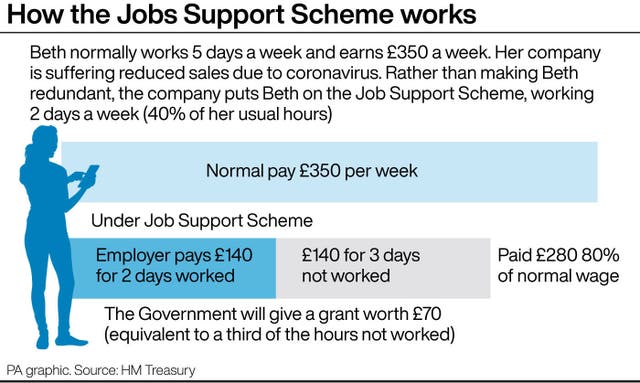Sunak Warned Of ‘1980s Levels’ Of Unemployment Despite Emergency Jobs Package
Shadow chancellor Anneliese Dodds warned unemployment was heading towards ‘1980s levels’.

Chancellor Rishi Sunak has been warned his latest emergency package will not be enough to prevent the loss of hundreds of thousands of jobs from sectors hardest hit by coronavirus.
Conservative peer Lord Wolfson, the chief executive of Next, said roles will be shed from the retail industry as consumers make a permanent shift to shopping online.
And shadow chancellor Anneliese Dodds warned unemployment was heading towards “1980s levels” despite Mr Sunak’s wage subsidy package, as official figures showed borrowing continued to soar.
Steve Barclay, who is Mr Sunak’s deputy as chief secretary to the Treasury, defended the measures as being targeted to roles that remain “viable” but warned “we cannot save every job”.
Sectors hardest hit by the restrictions in place to slow Covid-19’s spread continued to raise warnings despite the Chancellor’s Job Support Scheme to help pay wages for employees able to work at least a third of their hours.
Lord Wolfson told BBC Radio 4’s Today programme that the seemingly permanent shift to online shopping means that a lot of “unviable” jobs are in retail.
Asked if a lot of those roles are in retail, he replied: “I think that is right. I wouldn’t want to underestimate the difficulty that is going to cause a lot of people who work in retail.
“I think it’s going to be very uncomfortable for a lot of people. We will inevitably, and have already, reduced the number of people working in our shops and I’d expect that to continue over the coming five or six years as the demand for retail goes down.”
Ms Dodds questioned whether the wage support scheme will fail to incentivise employers to keep people on as she sounded the warning of further mass job losses.
“Certainly those unemployment levels are rising very substantially, they’re going back towards 1980s levels,” the Labour MP told Today.
“I think the real question now, and I asked this in Parliament yesterday of the Chancellor, is whether this system of targeted wage support will incentivise employers to keep people on.
“That’s the real kind of million-dollar question, because if it doesn’t, if it’s not actually designed in a way that will make it economically sensible for employers to keep people on, then unfortunately it won’t be living up to the promise of other wage support schemes that we’ve seen being so successful.”

Mr Barclay said it was “very sadly” the case that there will be more unemployment as a consequence of coronavirus but that support was targeted at getting those in “viable” jobs back to work while the unemployed can be retrained.
“The Chancellor has been very honest that we cannot save every job, but what we need to do with these measures is target our funding on jobs that are viable, enabling people to come back, rather than them being at home with a furlough that’s already for eight months, for a very long period of time,” he said.
“But the equally important thing is not just the number of people that are unemployed but how quickly we get them back into the labour market, because the length of unemployment is absolutely critical.”
Mr Barclay denied economic experts’ warnings that the new jobs protection scheme would not give enough of an incentive to employers to keep workers on, with suggestions it is cheaper to bring back one furloughed employee than two on half-time.
“The issue is that this is more than about spreadsheets, this is about the flexibility that employers said they want, they want to retain their skilled workforce,” he said.
Speaking before @UKParliament, the Chancellor @RishiSunak explained how the new Job Support Scheme will help support the wages of people working in viable jobs. #WinterEconomyPlan pic.twitter.com/6g4Ml3wlfU
— HM Treasury (@hmtreasury) September 24, 2020
The multibillion-pound Job Support Scheme, which will last for six months from November, will see the state and employers top up the wages of staff working at least a third of their normal hours.
A worker doing a third of their normal hours will still receive 77% of their usual pay, up to a cap – 33% from their firm for the hours worked, a 22% top-up from the employer and a further 22% from the state.
Other measures included in the package include an extension of the VAT cut for tourism and hospitality and more flexible terms for the repayment of Government-backed loans.
But sectors including the performing arts have warned there was little to help their venues remain open.
Mr Sunak argued it would be “fundamentally wrong” for people to be kept in jobs that can only exist due to state funding.
Official figures on Friday showed that national debt hit a new record at the end of August, as public sector borrowing increased by another £35.9 billion to hit £2,023.9 billion.
Meanwhile, the highest single-day total of lab-confirmed coronavirus cases in the UK was recorded on Thursday, with 6,634 positive tests.
Thanks for signing up to Minutehack alerts.
Brilliant editorials heading your way soon.
Okay, Thanks!

